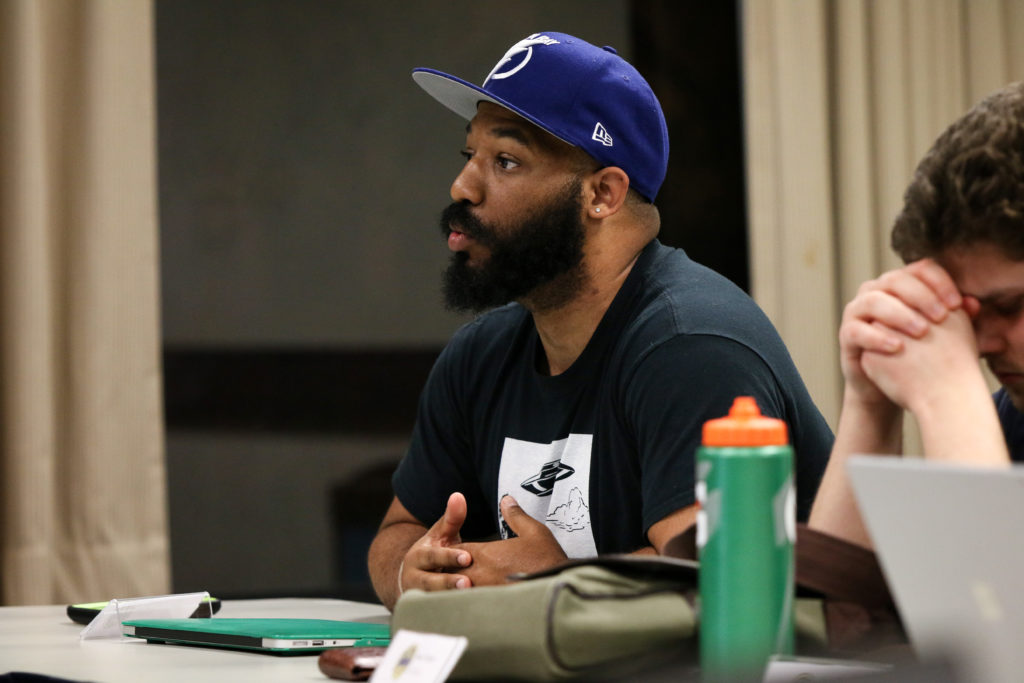Updated: April 11, 2019 at 4:54 p.m.
A Student Association senator is suing the SA in Student Court for allegedly inadequately representing graduate students.
SA Sen. AJ Link, Law-G, said he filed a complaint with the Student Court last week claiming that the SA has failed to give graduate students the same representation as undergraduate students. Link asks the court to ban the SA Senate from passing legislation next academic year until the group passes a bill putting forth a referendum that would give graduate students more at-large seats.
“The senate has continuously failed to act in a way that would rectify this lack of proper representation within its body,” the complaint, which was obtained by The Hatchet, reads. “This ongoing act is an injustice against every graduate student enrolled at George Washington University.”
Link’s complaint follows a series of changes to the SA constitution granting voting rights to freshman and first-year graduate senators. Students voted in favor of a referendum last spring to give freshman and first-year graduate senators voting privileges after spending one semester in the senate, converting their seats into at-large positions.
The change, which went into effect for the first time this spring, allows for a maximum of five undergraduate-at-large seats and four graduate-at-large seats, according to the constitution. But Link said those numbers are not fair considering that there are roughly 4,000 more graduate students than undergraduates at GW.
SA leaders filed a complaint with the Student Court last semester questioning the constitutionality of first-year voting rights, but the court later dismissed the case.
Link said the senate should pass a bill in the fall calling for a referendum to amend the SA’s constitution to make the number of seats for each group proportional. Students would vote on the referendum within 20 days of the bill’s passage, according to the SA constitution.
“I would prefer that graduate students are apportioned a greater number of seats than undergraduates,” Link said. “The numerical value of each does not matter as much as the fact the graduate students should always have more at-large seats given its greater number of students.”
The senate rejected a bill Link proposed earlier this semester that would have put forth a referendum capping the number of both undergraduate-at-large and graduate-at-large seats to four.
“The SA has yet to pass legislation that would allow for a constitutional amendment that would give graduate students representation that is proportionate,” Link said.
SA Chief Court Justice Darryl Jennings declined to comment, saying the court is still considering whether to hear the case. The court has until Tuesday – 12 class days after the complaint was filed – to decide whether to hear the case, according to the SA bylaws.
SA President Ashley Le said she supports a constitutional amendment to allocate more senate seats to graduate students, which she said would be “relatively uncontroversial.” But she said preventing the senate from passing any legislation until such an amendment is enacted would not be “beneficial to the senate or to the students that we represent.”
She said graduate seats are often harder to fill than undergraduate positions, but the SA has increased efforts this academic year to connect with the group. She said the SA began a newsletter for graduate students in October to “increase awareness and opportunities” for the community, and she said the next set of SA leaders should also host more events for graduate students to involve them in SA decisions.
“We hope that future SA administrations can keep that up and expand it even further, but also doing more intentional and active outreach to the graduate students community,” she said in an email.
SA Executive Vice President Ojani Walthrust declined to comment.
SA Sen. Anisha Hindocha, Law-G and the senate pro tempore, said graduate students are “grossly” underrepresented in the senate.
This year, two of four SA Senate committees were headed by graduate students – an “anomaly” compared to years past, Hindocha said. She chairs the governance and nominations committee, while Link chairs the student life committee.
“Senator Link’s plan would have started to shift the balance of representation to actually reflect this school’s population, and I think it’s wrong that there are members of SA leadership that oppose that,” Hindocha said in an email, referring to the rejected referendum.
This post was updated to reflect the following correction:
The Hatchet incorrectly reported that a bill proposed earlier this month would allot three undergraduate-at-large seats and four graduate-at-large seats. The bill would cap the number of both seats to four. We regret this error.





